From uproar over bankers’ bonuses, disruption due to doctors’ strikes, to scrutiny of the salaries of the top-paid BBC employees, the way we value different industry workers in modern society is a divisive and hot topic.
But if we were able to go back to the drawing board and start again, according to public opinion, what would the salaries of popular jobs look like? And are we over – or under – estimating what different professions earn to begin with? To find out, we surveyed 1,017 adults living in the UK.
Key Findings
- More than half survey respondents (52.8%) feel that doctors are being fairly compensated, although in real terms, the most common proposed salary for a doctor was £36,500 higher than the current annual wage.
- NHS pay-rise: Brits believe that nurses deserve an average salary of £62,500 – £28,500 greater than their current average wage.
- Public service providers: Brits proposed giving soldiers a greater pay rise (+£31,000) than primary-school teachers (+£22,000).
- Over half of Brits (55.3%) believe that the Prime Minister is currently overpaid (by an average of £79,286).
- The majority (86.3%) of people believe that the British royal family receives too much funding.
- Over a third (37.2%) of Brits believe there should be a maximum salary cap for all BBC staff, and 28.6% said their salaries should be lower and the extra money put towards programming.
- Brits think that FTSE 100 CEO’s should take a £4million annual pay cut (from £4,220,000 to £87,500).
- Survey respondents thought that Premier League footballers should take an almost £3 million annual pay cut (from £2,928,978 to £87,500).
Most people (64.6%) don’t think we fairly compensate different professions in the UK
Most of the respondents in the survey (64.6%) agreed that we should reconsider how we value different professions in UK society, and even more (84.5%) believe that we should cap salaries for certain professions.
When asked how we should value and compensate for different professions, 42.4% believed that we should value workers primarily on their personal skills and abilities. This was followed by their job impact on society (28.1%) and their education and experience (20.1%).
What should influence someone’s salary the most?
| Answers | Percentage of respondents |
|---|---|
| Personal skills and abilities | 42.4% |
| Job impact on society | 28.1% |
| Education and experience | 20.1% |
| Market demand | 9.4% |
But where should this money come from? Despite supporting a change (and in many cases, a pay rise) in many professions, most people (59%) wouldn’t be willing to pay higher taxes to support higher salaries for professionals in critical sectors. Instead, it appears that people would prefer to redistribute wealth. In 2025/26, the budget for the British royal family (funded by public and private sources, including taxes) actually increased by 188% since the previous year, from £45.8 million to £132.10 million. [1]
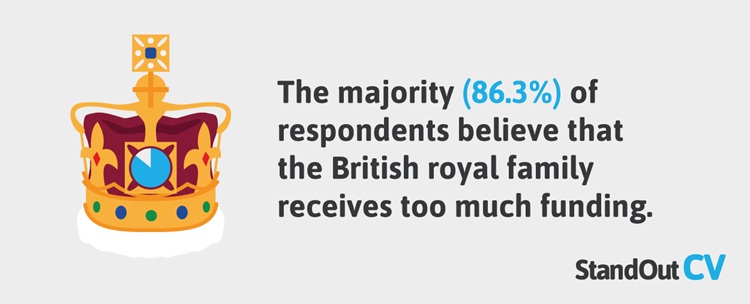
Only 13.7% of those surveyed thought that the British royal family should receive their current level of funding, and two in five (39.4%) believe there should be higher salaries for NHS workers.
Where respondents believed royal funding should be redistributed to
| Alternative option | Percentage of respondents |
|---|---|
| Higher salaries for NHS workers | 39.4% |
| More funding for schools and teachers | 18.2% |
| Increased police and emergency services pay | 17.4% |
| Nowhere, keep royal funding as it is | 13.7% |
| Social care and support workers | 11.3% |
What should healthcare workers earn?
The NHS is struggling: compared to similar high-income countries, there are almost 16% fewer fully qualified GPs in the UK. [2] Healthcare workers have responded by striking – including a strike by resident doctors in July 2025 – and in some cases, seeking work abroad. [3] A report from the Royal College of Nursing in 2024 found that the number of nurses proactively planning to migrate from the UK quadrupled between 2018/2019 and 2022/23 – primarily due to low pay.
But considering those working in healthcare, including not only nurses, paramedics, and doctors, but veterinarians too, how do people perceive the UK’s healthcare pay crisis?
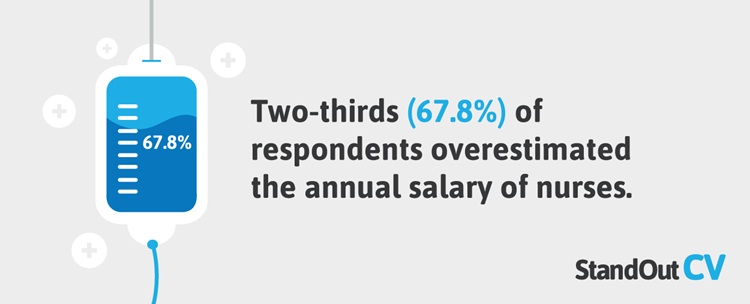
When asked to estimate each profession’s annual salary, the most common answers were that doctors earned the most (£100,000 – £150,000), followed by veterinarians and nurses (both with an estimated salary of between £50,000 – £75,000), and paramedics (£25,000 – £50,000).
Although these estimations were accurate for paramedics, respondents overestimated the salaries for nurses (which typically fall between £33,000 and £35,000) and veterinarians (who, according to the national careers service, typically earn between £30,000 – £50,000). [4] [5]
The pay for doctors in the NHS system varies wildly. The average wage for a doctor in Foundation training is £38,831, and as a consultant, the basic salary goes up to £145,478 per year. [6] However, those working privately can earn much more than this. The average private salary for consultants is £200,000-£300,000, but can reach up to a whopping £600,000 annually. [7]
But what do people think those working in healthcare should really earn? More respondents than not (52.8%) thought doctors were either paid fairly (37.9%) or too much (14.9%).
And perhaps because many respondents overestimated how much veterinarians earn, half of the respondents (50.5%) thought they were paid just right.
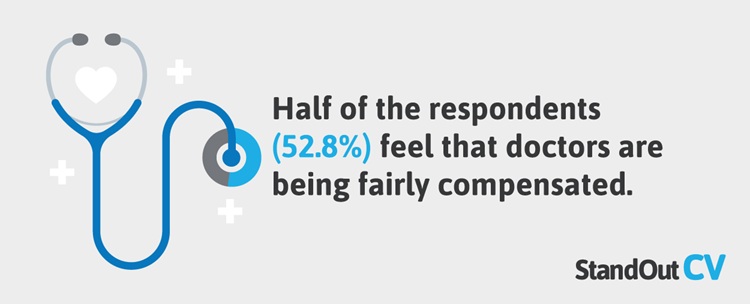
On the other hand, most respondents thought that paramedics and nurses were undervalued (71.2% and 74.4% respectively). For both these roles, the most common prospective salary was between £50,000 and £75,000 — a salary increase of £23,000 and £28,000, respectively.
Healthcare salaries
| Job type | Average salary | Most common proposed salary | Difference between the average salary and the proposed salary |
|---|---|---|---|
| Doctors | £88,500 | £125,000 | +£36,500 |
| Nurse | £34,000 | £62,500 | +£28,500 |
| Paramedic | £39,000 | £62,500 | +£23,500 |
| Vet | £40,000 | £62,500 | +£22,500 |
What should public service workers earn?
Jobs that provide a public service are crucial to a functioning society and are often funded by taxpayers. To find out how much respondents valued public service work, the survey considered the salaries of five public service roles: primary school teacher, social worker, police officer, soldier, and care worker.
Respondents guessed that all professions in this category earned between £25,000 and £50,000, but is this true? According to the National Careers Service, yes. Primary school teachers earn the most (typically between £32,000 – £49,000), and soldiers and care workers the least (typically between £26,000 and £37,000). [8]
The majority of respondents believed that all public service workers in the study earn too little. 70.4% think that primary school teachers are underpaid, 64.7% think that soldiers are underpaid, and 55.8% think that police officers are underpaid. For these three professions, the most common suggested salary was £50,000 – £75,000. In real terms, taking the mid-point of this range, this translates to a £31,000 pay increase for soldiers, the second greatest prospective pay increase of all professions in the study.
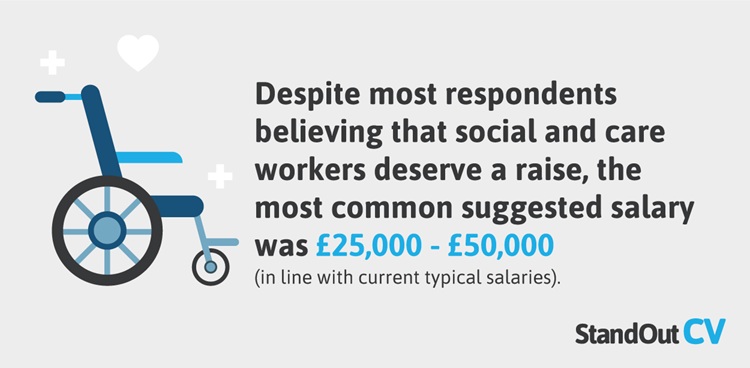
Three-quarters of respondents (75.8%) believe that care workers were undervalued, and 64.8% believe that social workers are underpaid. However, in real terms, when asked to give a figure, care workers and social workers were given a modest raise, with the most common answer being £25,000 – £50,000 once again.
Public service salaries
| Job type | Average salary | Most common proposed salary | Difference between the average salary and the proposed salary |
|---|---|---|---|
| Soldier | £31,500 | £62,500 | +£31,000 |
| Police Officer | £39,000 | £62,500 | +£23,500 |
| Primary School Teacher | £40,500 | £62,500 | +£22,000 |
| Social Worker | £31,500 | £37,500 | +£6,000 |
| Care Worker | £31,500 | £37,500 | +£6,000 |
What should entertainment industry workers earn?
A survey of 2,000 people in 2024 by the Royal Philharmonic Orchestra found that music was rated as Britain’s greatest international contribution, with film and television coming third. [9] Although the government has promised to invest £270 million into culture and arts, these sectors have been struggling for a long time. Between 2009 and 2021, per-person cultural funding was halved in England, and cut by around a third in Scotland and Wales. [10]
A life in showbiz may appear glamorous, but the reality is that respondents overestimated the salaries for all the entertainment professions in the study.
The most common guess for a musician’s annual salary was £25,000 – £50,000. However, the 2023 census found that a musician’s average annual income in the UK is £20,700, although nearly half earn under £14,000. [11]
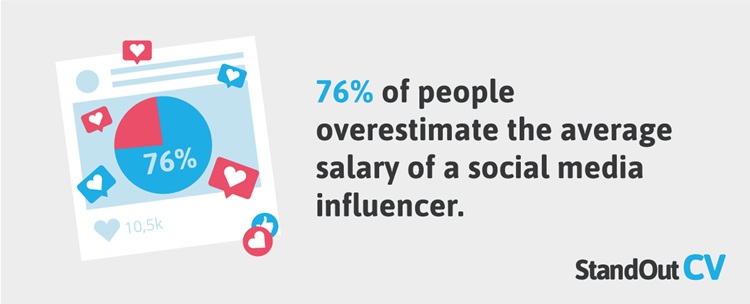
Looking at social media influencers, it’s true that some earn a lot of money for their online content. A “mid-tier influencer” can get £2.5k per post, “macro influencers” can get up to £10k per post, and “mega influencers” can get more than £10k per post. [12] But the reality is that most social media influencers earn an average of between £26,000 and £39,000 a year. [13] Respondents typically overestimated the average salary, and the most popular guess was £50,000 – £75,000.
Broadcast journalists earn on average between £23,000 – £42,000, according to the national careers service. [14] However, respondents assumed they were considerably better off, with the most common guess being £50,000 – £75,000. And respondents also overestimated the salary of TV presenters, with the most common answer being £75,000 – £100,000, when the actual average is closer to £34,000. [15]
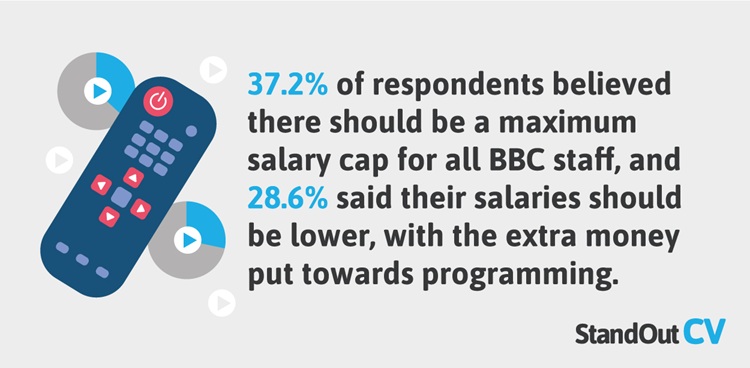
This might be because, although this is the average amount, a great deal of publicity is given to the very high earners in this field. For example, the BBC (which is publicly funded) releases a list of its top earners each year. In 2025, its top earner was sports broadcaster Gary Lineker (who earned £1.35 million).
When asked if the BBC should change its salaries, the most common answer (37.2% of respondents) was that there should be a maximum salary cap for all BBC staff. A further 28.6% said their salaries should be lower and the extra money put towards programming, and 15% said all BBC salaries should be made public. Not everybody agreed that the BBC salaries should be lowered, though: 14.1% said that they should compete with commercial TV salaries, and 5.1% believed they should be increased to attract the top talent.
Musicians were the only profession in this category where respondents thought they weren’t being overpaid, with 50.1% believing they were being paid the right amount (although these respondents also overestimated what an average musician earns to begin with).
When asked what these professions should earn, social media influencers turned out to be not only the least valued profession in this category, but in the study overall: with the most common suggested salary being £10,000 – £25,000 (32.8%), the smallest option. Despite overestimating their earnings to begin with, three-quarters (74.1%) said that they believed social media influencers were overpaid.
TV presenters were the second most likely profession in the category to be perceived as overpaid (65.1%), followed by broadcast journalists (52.2%).
Entertainment industry salaries
| Job type | Average salary | The most common proposed salary | The difference between the average salary and the proposed salary |
|---|---|---|---|
| Broadcast Journalist | £32,500 | £62,500 | +£30,000 |
| TV Presenter | £34,000 | £62,500 | +£28,500 |
| Musician | £20,700 | £37,500 | +£16,800 |
| Social Media Influencer | £32,500 | £17,500 | -£15,000 |
What should white-collar workers earn?
A white collar job is any job that requires knowledge-based, professional, or managerial work. This definition covers a variety of job types, but in this survey, we considered four white-collar job roles: FTSE100 CEO, investment banker, lawyer, and scientist.
In the UK, British CEOs earn 100 times what they pay their employees. [16] According to research by the High Pay Centre, the median FTSE 100 CEO pay (excluding pension) currently stands at £4.22 million. [17] But only 2.8% of respondents guessed this correctly. The most common guess was far lower at £500,000 – £1,000,000.
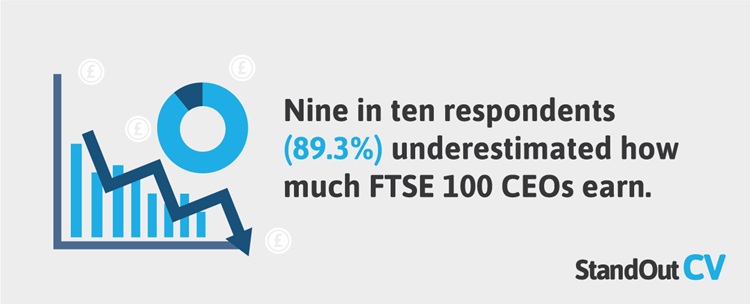
Respondents were more likely to overestimate the salary of investment bankers, however. Entry-level analysts in London typically earn a base salary ranging from £48,000 – £69,000, with total compensation (including bonuses) averaging between £84K and £165K. However, your take-home pay can vary based on various factors, and managing directors can take home more than £500,000 a year. [18] Respondents overestimated how much the average investment banker earns, though the most common responses were £500,000 – £1,000,000 (13.3%) and £250,000 – £500,000 (13.2%).
According to the careers service, the typical salary for a lawyer ranges between £30,000 and £80,000 a year. [19] Out of the three job professions in this category, respondents guessed the average salary of a lawyer most correctly, with the most common answer being £50,000 – £75,000.
Scientists in the UK earn on average between £27,000 to £48,000. [20] But although 20.2% of respondents were able to guess this correctly, the most common guess was £50,000 – £75,000, indicating that public perception is skewed.
Four in five (80.1%) think that FTSE100 CEOs were overpaid, and three in four (75.1%) think that investment bankers were overpaid. The most common suggested salary for both professions is £75,000 – £100,000.
However, 49.2% of respondents think lawyers are appropriately compensated (and the remaining 38.8% think that lawyers are overpaid, and 12% thought they were underpaid). Consistent with this, the prospective salary for lawyers was £50,000 – £75,000.
As established before, respondents were likely to overestimate what scientists earn. So it’s not surprising that 52.8% of respondents believed scientists were appropriately compensated (with only 31.6% believing that they are underpaid). When asked to choose a figure, respondents most commonly suggested that scientists should earn £50,000 – £75,000, the same figure they incorrectly believed to be the typical real salary.
White collar salaries
| Job type | Average salary | The most common proposed salary | The difference between the average salary and the proposed salary |
|---|---|---|---|
| Scientist | £37,500 | £62,500 | +£25,000 |
| Lawyer | £55,000 | £62,500 | +£7,500 |
| Investment Banker | £124,500 | £87,500 | -£37,000 |
| FTSE100 CEO | £4,220,000 | £87,500 | -£4,132,500 |
What should professional athletes and Premier League footballers earn?
According to research by Capology, the average annual Premier League salary is £2,928,978 a year. [21] But this isn’t typical for all professional sportspeople; according to the Economic Research Institute, the typical salary is closer to £31,796. [22]
The salary also differs depending on gender. A survey of elite sportswomen in 2024 found that a third of them had considered giving up on their sporting careers due to the cost of living, and three-quarters of the respondents earned less than £30,000 a year. [23] Looking at Premier League Footballers specifically, Harry Kane (the England men’s captain) earns more in a week than Leah Williamson (the England women’s captain) earns in a year. [24] [25]
When asked how much a professional athlete earns, the most common answer was £25,000 – £50,000 (which is accurate). However, when asked what Premier League Footballers earn, the most popular answer was more than £5,000,000 – the greatest option in the survey. Although this is not the average salary, some footballers do indeed earn upwards of £5,000,000 per year. The highest-paid footballer in the UK at the time of writing, Erling Haaland, earns £525,000 per week, meaning he would only need to play 10 weeks of the year to earn more than £5 million. [26]
When asked what they think Premier League footballers should earn, the most common response was £75,000 – £100,000, with 88.4% of respondents saying they were overpaid.
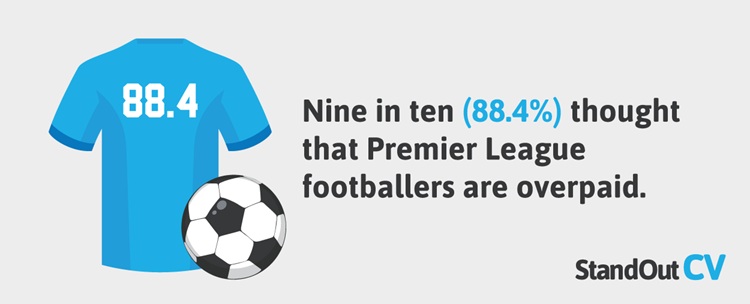
Half (49.6%) of respondents believed that professional athletes are paid fairly, and this was reflected in the prospective salary respondents chose, which were also £25,000 – £50,000.
Sportsperson salaries
| Job type | Average salary | The most common proposed salary | The difference between the average salary and the proposed salary |
|---|---|---|---|
| Premier League Footballer | £2,928,978 | £87,500 | -£2,841,478 |
| Athlete | £31,796 | £37,500 | £5,704 |
What should the Prime Minister earn?
The Prime Minister is entitled to two salaries, £91,346 for being a member of parliament and an additional £80,807 for being Prime Minister (although only £75,440 is claimed). Combined, this sums to £166,786. Besides this income, the top gig also comes with a main residence (10 or 11 Downing Street) and a country residence (Chequers). [27]
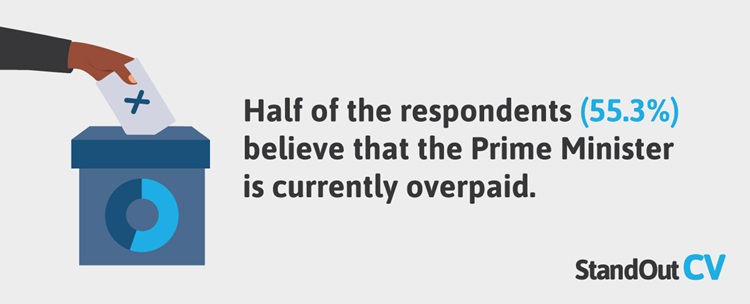
When asked what they thought the Prime Minister earned, 21.2% guessed correctly (£150,000 – £250,000). When asked what they think the Prime Minister should earn, the most common response was £75,000 – £100,000 (20.2%) – which is a pay cut of between £91,786 and £66,786. When asked if people thought the Prime Minister was underpaid, overpaid, or paid just right, 55.3% thought the Prime Minister was overpaid, 32.9% thought the Prime Minister was paid correctly, and the remaining 11.8% believed he was underpaid.
Prime Minister’s salary
| Job type | Average salary | The most common proposed salary | The difference between the average salary and the proposed salary |
|---|---|---|---|
| Prime Minister | £166,786 | £87,500 | -£79,286 |
Sources
[1] House of Commons Library, ‘Finances of the Monarchy’
[2] GOV.UK, ‘Government to tackle NHS workforce crisis with refreshed plan’
[3] GOV.UK, ‘Resident doctor strikes: everything you need to know’
[4] National Careers Service, ‘Vet | Explore Careers’
[5] National Health Service ‘Working for the NHS in England | Health Careers’
[6] National Health Service ‘Pay for doctors | Health Careers’
[7] Medic Portal, ‘How Much Do Doctors Make in the UK?’
[8] National Careers Service, ‘Primary school teacher | Explore Careers’
[9] Royal Philharmonic Orchestra ‘Report: Brits rate music as Britain’s greatest export to the world more than anything else’
[10] Musician’s Union, ‘Why Arts Funding is Essential’
[11] Help Musicians’, ‘First ever Musicians’ Census provides unparalleled insight into the into the careers of the UK’s music creators’
[12] Fiverr, ‘Influencer Marketing Costs: Prices Guide for 2025’
[13] Glassdoor, ‘Salary: Social Media Influencer in United Kingdom 2025’
[14] PayScale, ‘Television Presenter Salary in United Kingdom in 2025’
[15] Explore Careers, ‘Broadcast journalist’
[16] LSE Business Review, ‘British CEOs earn 100 times what they pay employees’
[17] High Pay Centre ‘FTSE 100 bosses make more money in less than three days than the average worker does in a year’
[18] Preplounge, ‘Investment Banking Salaries in the UK 2025’
[19] Explore Careers, ‘Solicitor’
[20] Explore Careers, ‘Research scientist’
[21] Capology, ‘2025-2026 Premier League Salaries and Contracts’
[22] Economic Research Institute, ‘Professional Athlete Salary in United Kingdom (2025)’
[23] BBC, ‘BBC Elite British Sportswomen’s Study 2024: Athletes on income, trolling, maternity and sexism’
[24] OneFootball, ‘Arsenal Women’s Williamson £200k per year vs Partey on £200k per week’
[25] Goal.com, ‘Harry Kane salary: How much does Bayern Munich star earn per week and annually in the Bundesliga?’
[26] Capology, ‘Erling Haaland Salary Profile’
[27] BBC, ‘What does the prime minister do and how much are they paid?’
Methodology
A survey on behalf of StandoutCV was conducted in June 2025 and asked 1,017 UK adults to estimate how much different professions earn in the UK, and what they should earn.
These questions covered 20 roles in a variety of sectors:
- FTSE100 CEO
- Law
- Investment Banker
- Premier League Footballer
- Athlete
- Doctor
- Vet
- Paramedic
- Nurse
- Broadcast journalist
- Social Media Influencer
- Musician
- TV Presenter
- UK Prime Minister
- Primary School Teacher
- Social Worker
- Police Officer
- Soldier
- Care Worker
- Scientist
The demographics of the survey respondents were:
Gender:
Female 49.3%
Male 50.7%
Age:
18 – 28: 12.9%
29 – 44: 33.3%
45 – 60: 32.3%
61 – 70: 15.5%
71+: 6.0%
©️©️ This work is licensed under a Creative Commons Attribution-ShareAlike 4.0 International License.


